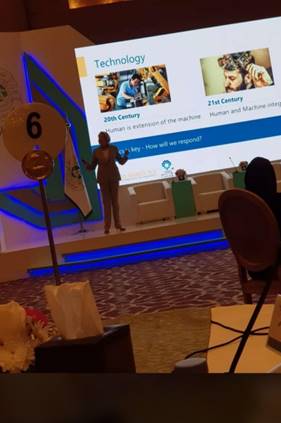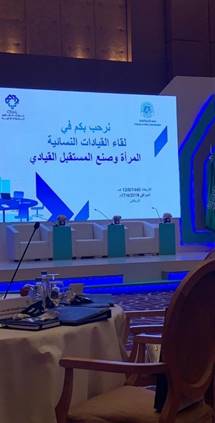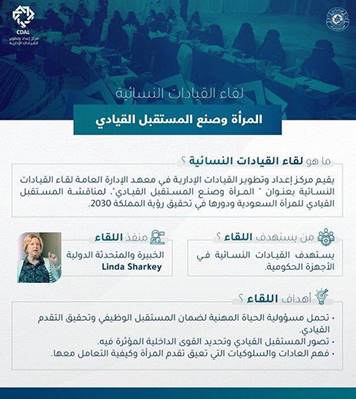SDG5 Gender Equality
Sustainable Development Goal 5 (SDG5) focuses on achieving gender equality and empowering all women and girls. Saudi Arabia has made significant progress toward this goal through national reforms, legislation, and social initiatives. Majmaah University, on the other hand, plays a key role in supporting gender equality through education, research, and community programs.
KSA’s Efforts in Addressing SDG5 (Gender Equality)
In recent years, Saudi Arabia has implemented several reforms and policies aimed at enhancing gender equality and empowering women:
Vision 2030 and Gender Equality:
Saudi Arabia's Vision 2030 is central to the country's efforts toward achieving gender equality. One of its main pillars is increasing women’s participation in the workforce, which has grown significantly due to new policies that enable women to enter various sectors, including finance, engineering, and technology. The goal is to increase female workforce participation to 30% by 2030.
Legal Reforms:
Several legal reforms have been introduced to empower women and ensure equality in various aspects of life. Key changes include:
The removal of guardianship laws, allowing women to travel, study, and work without the approval of a male guardian.
The right to drive, granted to women in 2018, which has been a significant milestone in promoting female independence and participation in the economy.
Reforms that ensure women have equal access to education, employment, and public services.
Economic Empowerment:
The Saudi government has launched initiatives such as the Women’s Empowerment Program, which focuses on creating opportunities for women in leadership positions and encouraging their participation in male-dominated industries. Through grants, funding programs, and business development initiatives, women are becoming more active in the entrepreneurial and corporate sectors.
Educational Equality:
Women now have equal access to education at all levels, with female university enrollment in Saudi Arabia outpacing male enrollment in some disciplines. The government has also promoted STEM education for women, with more programs encouraging female participation in science, technology, engineering, and mathematics fields.
Combating Gender-Based Violence:
Saudi Arabia has introduced new laws to combat domestic violence and gender-based violence, including stricter penalties and more robust mechanisms for reporting abuse. The National Family Safety Program is part of the government’s efforts to support victims of abuse and ensure justice.
Majmaah University’s Role in SDG5 (Gender Equality)
Majmaah University plays a key role in supporting gender equality through its academic programs, research initiatives, and community involvement:
Inclusive Education for Women:
Majmaah University is committed to providing equal educational opportunities for female students. Women make up a significant portion of the student body, and they have access to the same programs, resources, and facilities as their male counterparts. The university offers diverse academic disciplines for women, including those in traditionally male-dominated fields like engineering and business.
Support for Women in STEM:
The university encourages women to participate in STEM fields through targeted programs, scholarships, and awareness campaigns. These initiatives align with national efforts to boost women’s involvement in sectors critical to the Kingdom’s economic transformation.
Women’s Empowerment Initiatives:
Majmaah University actively promotes women’s empowerment through workshops, leadership training, and career development programs. The university provides female students with opportunities to develop leadership skills, engage in community service, and pursue entrepreneurship. This aligns with Saudi Arabia’s broader goal of increasing female representation in the workforce and leadership positions.
Gender Studies and Research:
Majmaah University conducts research on gender-related issues, including women’s participation in the workforce, gender equality in education, and challenges facing female professionals. The university’s research contributes to national and global discussions on gender equality, helping to inform policy and program development in Saudi Arabia.
Community Engagement:
The university plays an important role in promoting gender equality in local communities through outreach programs. These programs often focus on raising awareness about women’s rights, promoting gender-sensitive policies, and advocating for women’s empowerment in various sectors. The university also collaborates with government and private institutions to address gender disparities.
Both the Saudi government and Majmaah University are making significant strides in promoting gender equality and achieving the goals of SDG5. Through Vision 2030, Saudi Arabia is working to increase women’s participation in the economy, promote their rights, and provide equal opportunities in education and employment. Majmaah University complements these efforts by offering inclusive education, supporting women’s empowerment, and conducting gender-focused research. These combined efforts contribute to the broader objective of fostering gender equality and empowering women and girls in the Kingdom.
https://www.mu.edu.sa/sites/default/files/content/2020/10/General%20Student%20Handbook.pdf
Majmaah University does not discriminate or permit discrimination by any member of its community against any individual on the basis of race, color, religion, national origin, sex, parental status, marital status, age, disability, citizenship, or any other classification protected by law in matters of admissions, employment, services or in the educational programs or activities it operates. Harassment, ,whether verbal, physical, or visual, that is based on any of these characteristics is a form of discrimination. This includes harassing conduct affecting tangible job benefits, interfering unreasonably with an individual’s academic or work performance, or creating what a reasonable person would perceive is an intimidating, hostile, or offensive environment.
https://www.mu.edu.sa/sites/default/files/content/2020/10/General%20Student%20Handbook.pdf
The Majmaah University adheres to all the Kingdom laws banning discrimination in public institutions of higher education. The University prohibits discrimination against any employee, applicant for employment, student or applicant for admission on the basis of any protected class. Protected classes include: age, color, creed, disability, ethnicity, marital status, or race. This policy covers discrimination in employment as well as in access to educational opportunities.
Discrimination is defined as adverse treatment of an individual based on that individual’s membership in one or more of the protected groups listed above. Therefore, any member of the campus community, guest, or visitor who acts to deny, deprive, or limit the educational, employment, housing and/or social access, benefits, and/or opportunities of any member of the campus community on the basis of their actual or perceived membership in the protected classes listed above is in violation of the University policy on discrimination. All University employees shall report all suspected incidents of discrimination or harassment. When brought to the attention of the University, any such discrimination will be appropriately remedied by the University according to the procedures outlined in this policy.
https://www.mu.edu.sa/sites/default/files/content/2020/10/General%20Student%20Handbook.pdf
Harassment and bullying may include electronic, written, verbal, or physical act or conduct toward a student which is based on any actual or perceived trait or characteristic of the student and which creates an objectively hostile environment that meets one or more of the following conditions:
a. Places the student in reasonable fear of harm to the student’s person or property.
b. Has a substantially detrimental effect on the student’s physical or mental health.
c. Has the effect of substantially interfering with a student’s academic performance.
d. Has the effect of substantially interfering with the student’s ability to participate in or benefit from the services, activities, or privileges provided by a college.
The University prohibits harassment against any employee, student, visitor, or guest on the basis of any class protected by University policy. This policy is not meant to inhibit or prohibit educational content or discussions inside or outside of the classroom that include germane but controversial or sensitive subject matters. The sections below describe the specific forms of prohibited harassment under University policy.
Bias-Related Harassment:
This University prohibits any form of harassment on the basis of actual or perceived membership in a protected class, by any member or group of the campus community, which unreasonably interferes with an individual’s work or academic environment. This environment may be created by verbal, written, graphic, threatening, and/or physical conduct that is sufficiently severe, persistent, or pervasive so as to interfere with, limit, or deny the ability of an individual to participate in or benefit from educational programs or activities or employment access, benefits, or opportunities. Merely offensive conduct and/or harassment of a generic nature not on the basis of membership in a protected class may not result in a violation of this policy but may be addressed through education and/or other resolution methods.
Stalking:
Stalking is defined as a course of conduct directed at a specific person that is unwelcome and would cause a reasonable person to feel fear or suffer substantial emotional distress. Examples include, but are not limited to:
a. sending multiple unwanted text messages, phone calls, or electronic communications
b. following, watching, photographing, or otherwise tracking an individual without his or her permission
c. sending unwelcome gifts, notes, or other items to another person
Program entitled "International Day for the Elimination of Violence against Women"
https://www.mu.edu.sa/ar/news/colleges/college-of-science-and-human-studies-at-hotat-sudair/186946
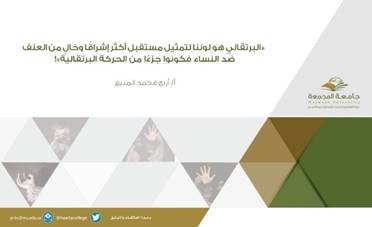
The college held a program in the female students’ sections entitled “International Day for the Elimination of Violence against Women” on Thursday 5/5/1443 AH, where the college’s female members participated with short speeches about women’s social, economic and psychological rights, and urged concerted efforts to create a comprehensive social awareness of the issue of violence against women. The program aimed to:
Raising awareness on the issue of violence and ensuring a correct, enlightened understanding of our values and cultural heritage.
Statement on women's rights and issues related to violence against women.
Highlighting the Kingdom's efforts to prevent violence against women.
Focus on the comprehensive empowerment of women and the protection of their social, economic and psychological right.
Workshop entitled "Pioneering Women"
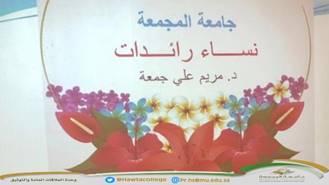
The Community Service Unit in the female students’ sections, in cooperation with the Department of Islamic Studies, held a workshop entitled “Pioneering Women” on Thursday 3/3/1441 AH at the Education Office in Hawtah Sudair. The workshop was presented by Dr. Maryam Ali Juma, who explained the concept of leadership and its fields, and presented examples of pioneering women of the pre-Islamic era such as Al-Khansa and Zarqa Al-Yamamah. She also spoke about the Mothers of the Believers and a number of female companions such as Al-Shifa Al-Adawiya and Rufaida Al-Aslamiya, and mentioned examples of pioneering women of the modern era.
A dialogue session entitled: (Saudi Women and the Sustainable Development Goals)
https://www.mu.edu.sa/ar/centers-and-institutes/cifal-center/206716
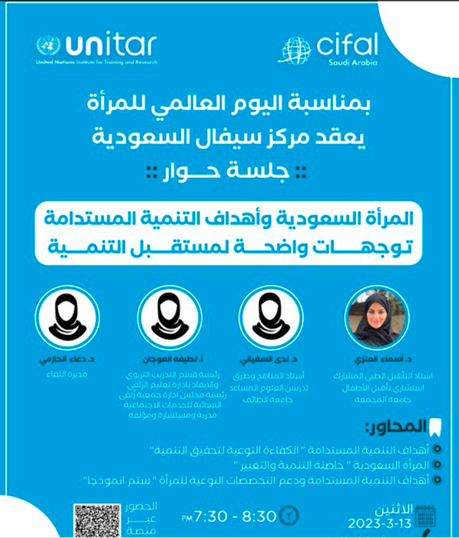
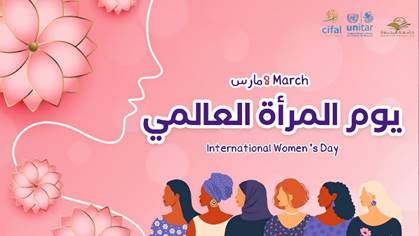
Within the activities of the training unit, the unit organized an event entitled :(Women's Rights and Duties)
Activity Summary:
The course began with the definition of women's rights, then the definition of the status of women in other societies (Greece, Romans, India, Jews, Christians, then the status of women in the pre-Islamic era, and Islam), then the definition of women's rights: their right to education, their right to participate in life, their right to choose a husband, their right to dowry, then their right to spend on them, and then their rights if divorce occurs.
As for her duties, we talked about the fact that a woman – in general – must do what a man should do, except for what concerns the man, so she must pay the legitimate costs.
Activity Objectives:
Knowledge of women's rights and duties.
Identify the status of women in other nations.
Identify the status of women in Islam.
Learn about women's rights.
Recognize the duties of women.
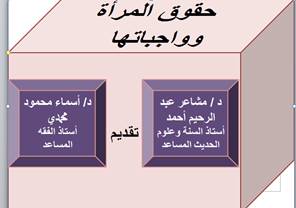
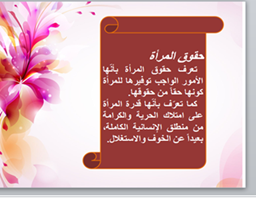
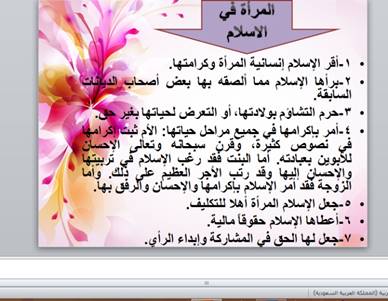
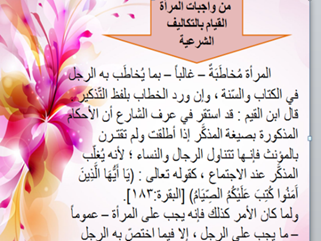
https://www.mu.edu.sa/ar/news/general/199386
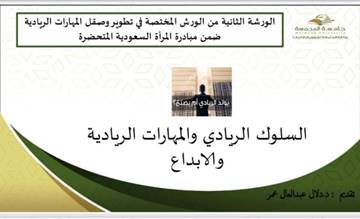
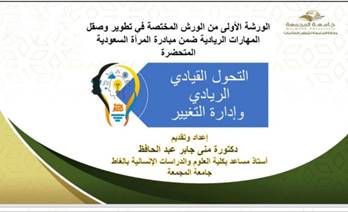
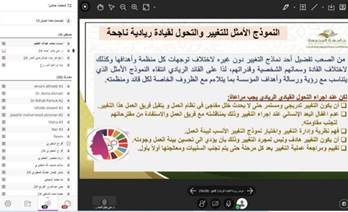
Under the patronage of the President of the University, Prof. Saleh bin Abdullah Al-Mizil, the University Vice Presidency for Female Student Affairs held a package of workshops specialized in developing and refining entrepreneurial skills to enhance the pioneering and strategic role of women at the university during the second semester of the year 1444 AH. Within the initiative (Saudi Civilized Women)
The workshops were presented over a period of two weeks and received a distinguished attendance of (215) university employees, and the Vice President for Female Student Affairs opened the package concerned with the importance of the pioneering role of Saudi women during the era of the Custodian of the Two Holy Mosques King Salman bin Abdulaziz, may God protect him, and the importance of acquiring entrepreneurial skills in accordance with the ambitious vision of the Kingdom of Saudi Arabia 2030, and the activities began with a workshop entitled (Pioneering Leadership Transformation and Change Management) presented by Her Excellency Dr. Mona Jaber Ahmed, a faculty member at the College of Science and Human Pedals in Ghat, followed by the second workshop Which was presented by Her Excellency Dr. Dalal Abdel Aal, a faculty member at the College of Business Administration, entitled Entrepreneurial Behavior (Entrepreneurship and Creativity Skills), and finally concluded the workshops specialized in developing and refining entrepreneurial skills with a workshop entitled: Entrepreneurial Leadership (Reality and Requirements) presented by Ms. Jawaher bint Muhammad Al-Zoman, a faculty member at the College of Business Administration, and all workshops dealt with the importance of entrepreneurial leadership and the role of women in making change and creativity within the Kingdom's Vision 2030.
In conclusion, the Vice President for Female Student Affairs expressed her thanks and appreciation for the support and sponsorship of the President of the University and everything that would develop and refine women's skills and their strategic leadership role at Majmaah University.
I ask the Almighty God to perpetuate this country's pride and leadership.
https://www.mu.edu.sa/ar/news/general/195431
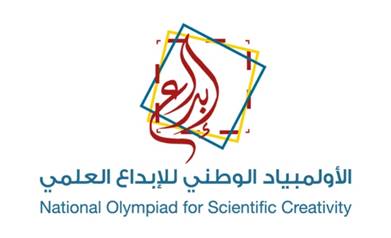
A group of academics and specialists from the university participated in the research supervision of talented students participating in the National Olympiad for Scientific Creativity "Ibdaa" for the year 2022, which is organized by the Ministry of Education and the King Abdulaziz and His Companions Foundation for Giftedness and Creativity "Mawhiba", in application of the education policy in the Kingdom to encourage and develop the spirit of research and scientific thinking, as the Olympiad comes in an effort to create a competitive creative scientific environment that stimulates the mind of the scientific researcher, and prepares it for competition and entry into the global knowledge system based on innovation and scientific research. To achieve sustainable national development.
The Innovation and Entrepreneurship Center at the university held a number of meetings and meetings, in order to introduce the National Olympiad for Scientific Creativity and follow up on developments and developments in students' projects, where a group of faculty members in different disciplines participated from the university, namely: Dr. Abdulaziz Al-Mutairi from the College of Engineering, and Dr. Fadia Al-Mutairi from the College of Computer Science and Information Technology, and Dr. Hoda Hakim from the Faculty of Medicine, Dr. Amani Hassan from the Faculty of Science, Dr. Warda Al-Hokail from the College of Education, Mr. Hajar Al-Mujahid from the College of Science, and Ms. Ashwaq Al-Mutairi from the College of Education.
It is worth mentioning that the National Olympiad for Scientific Creativity is an annual scientific competition targeting middle or high school students, which is based on competition in one of the scientific fields, by submitting individual scientific projects in accordance with the required special standards and controls, and the projects are governed according to specific scientific criteria in order to identify distinguished projects to be nominated for the highest competitive stages.
This participation comes with the support of His Excellency the President of the University, Prof. Saleh bin Abdullah Al-Mizil, and the follow-up of the Vice President for Female Student Affairs, Dr. Jawaher bint Abdulrahman Al-Omar, to enhance the research and innovation system and pay attention to achievements in the various fields of science and knowledge.
omen Empowerment in Scientific Research Forum
Under the guidance of His Excellency the President of the University, Dr. Khalid bin Saad Al-Muqrin, the Vice President for Female Student Affairs, Dr. Jawaher bint Abdulrahman Al-Omar, attended
Forum on Empowering Women in Scientific Research, organized by the Deanship of Scientific Research at um Al-Qura University, which was held on Sunday and Monday, 6-7/7/1441 AH.
Her Excellency the Vice-Rector for Female Students confirmed that such forums are in line with the Kingdom's Vision 2030 in terms of empowering women in all fields.
Especially in the field of scientific research, and the number of university leaders was attended by Her Excellency the Vice Dean for Scientific Research for Female Sections, Dr. Huda Al-Barrak.
And Her Excellency the Vice Dean for Science and Human Studies in Al-Houta, Dr. Noura Al-Shehri, and for her part, Her Excellency the Undersecretary thanked Her Excellency
The Rector of the University to open the opportunity for women leaders at the university to participate in this forum.
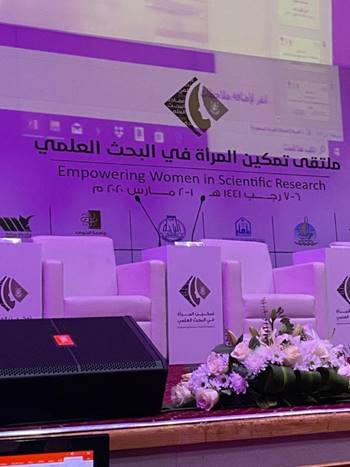
Invitation to attend the symposium on empowering women, present and future (remotely)
https://www.mu.edu.sa/ar/news/departments/office-of-the-vice-rector-female-student-affairs/177966
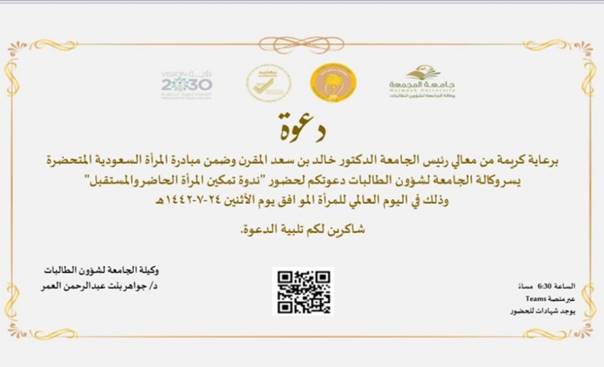
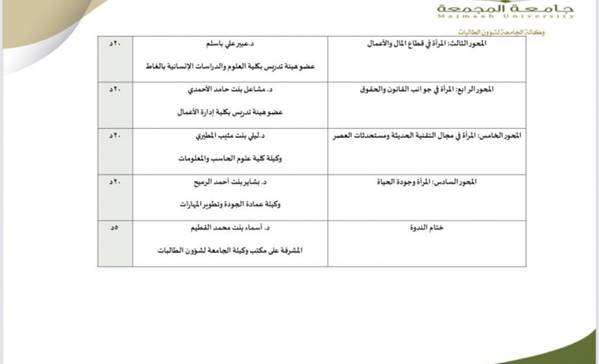
Under the patronage of His Excellency the President of the University, the Vice Presidency for Female Student Affairs holds a symposium on "Empowering Women, Present and Future" remotely, within the initiative of civilized Saudi women, in conjunction with International Women's Day, and the symposium presents a number of axes that deal with empowering women in multiple aspects such as scientific research, community service, the financial and business sector, the fields of human rights and legal, innovations of the age and quality of life, and the Agency is honored to attend all university employees on Monday 24-7-1442 AH / 8-3-2021 AD You can attend by scanning the barcode according to The announcement attached to the invitation.
Or through the link: https://qrco.de/bbzK4t
At the kind invitation of His Excellency the Director General of the Institute of Public Administration and with the approval of His Excellency the President of the University, Dr. Khalid bin Saad Al-Muqrin, Her Excellency the Vice-Rector for Female Student Affairs, Dr. Jawaher bint Abdul Rahman Al-Omar, participated on Wednesday 12/8/1440 AH in the first meeting of women leaders, which is organized by the Center for the Preparation and Development of Administrative Leaders at the Institute of Management entitled (Women and Making the Leadership Future). Implemented by international expert Linda Sharkey ( This meeting came in line with the directives of the leadership of the Kingdom of Saudi Arabia, represented by the Custodian of the Two Holy Mosques King Salman bin Abdulaziz, and His Royal Highness Crown Prince Mohammed bin Salman bin Abdulaziz, may God protect him, towards empowering women and developing their leading role in administrative development in a way that contributes to achieving the goals of the Kingdom's Vision 2030.
